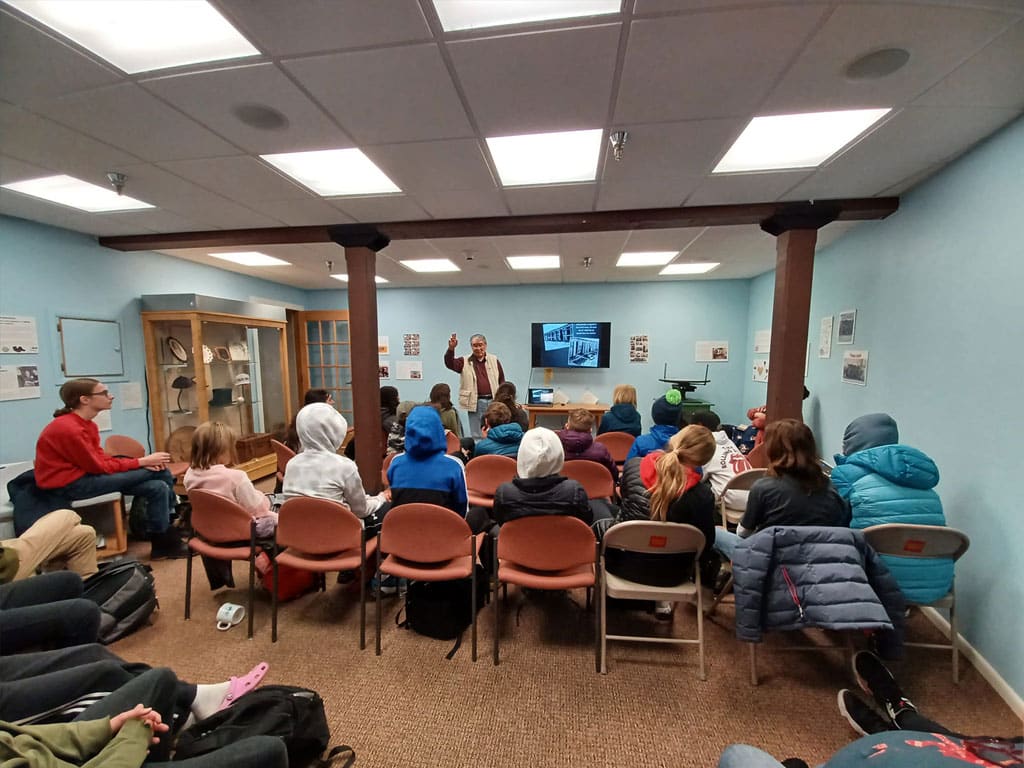Grantee Spotlight
Grantee: Historical Museum at Fort Missoula, Missoula, MT
Award: $5,000 Regular Grant
Project: Life Behind Barbed Wire Program
Montana’s history is rich, diverse, and complicated. With support from Humanities Montana, The Historical Museum at Fort Missoula’s Life Behind Barbed Wire program welcomed guest speakers Sam Mihara and Yukio Shimomura to Missoula to talk about their experiences in Japanese internment camps in the U.S. during WWII. We are excited to share more about this project and asked Matt Lautzenheiser, Executive Director, and project lead, to reflect on his experience.
Can you give a brief history of your Humanities Montana-supported project?
The Historical Museum at Fort Missoula applied for a Regular Grant in the fall of 2019 and received funding in 2020. Our funding was intended for a series of public programs related to the story of Japanese Internment at Fort Missoula during WWII. Unfortunately, the pandemic presented many challenges. In addition to not being able to gather for two years, we were also making travel arrangements for two men who spent time in one of America’s concentration camps. Both Sam Mihara and Yukio Shimomura are in their 80’s and for quite a long time it was simply unsafe for them to travel.
Despite many delays and setbacks, we were finally able to welcome Sam Mihara to Missoula in October of 2021, and Yukio Shimomura in the Spring of 2023. We are eternally grateful to Humanities Montana for their willingness to work with us on this. Both men presented programs on their experiences being imprisoned at a concentration camp and the long ranging impact that this experience had on them and their families. Both Sam and Yukio presented to a public audience, and Yukio also provided school programs at Big Sky High School, Stevensville High School, and the Missoula International School.
The power in programs like this is for members of our community to have the opportunity to engage and interact with a person who has lived through a tragic time in our history. It puts a face to a story and truly brings the lessons from tragic events like the incarceration of Japanese Americans to the forefront.
In your opinion, what was the most notable accomplishment of your project?
It’s incredibly important to raise awareness of all our history, and not just the things that make us feel good about ourselves. Sometimes the greatest lessons we learn come from our mistakes and not just our successes. It’s also important to share history in a way that is inclusive to all voices. The stories of all Americans make up the narrative history of our country. We are hopeful that in some small way, programs like those provided by Yukio and Sam educated our local community about something they didn’t previously know, perhaps even gave them a new perspective through which to consider our local and regional history. That’s the real goal in doing history, to help us all better understand the American experience from all perspectives. Doing history in this way influences not only our understanding of the past but also to better consider current events.
What lessons did you learn along the way?
I learned that pandemics and public events don’t go together very well. On a more serious note, doing programs like these help me to better understand and appreciate the community that I live in. Missoulians in general are curious, open-minded, and willing to really consider diverse viewpoints. At the Historical Museum at Fort Missoula, we’ve worked for over a decade to raise awareness of the stories of the 1200 Italian Nationals and 1000 Japanese resident aliens who were wrongfully imprisoned at Fort Missoula. Every step along the way we’ve been embraced by our community and supported in these efforts. We’ve received this support despite the fact that there is not a large Japanese American community in Western Montana. All of our events related to internment have been well attended and the community has stepped up to help with fundraisers to support preservation projects.
What else do you think Montanans should know about your project?
What I would like them to know is that if they are interested in the topic of Japanese and Italian Internment either generally or at Fort Missoula, they should visit the Historical Museum and keep an eye on our public events. We are committed to raising awareness about what took place at Fort Missoula during WWII, and this is just one of the many programs and exhibits we offer related to this history.
There are also a number of other sites nationwide concerned with the topic, excellent museums, and visitor centers at places like Heart Mountain, Minidoka, Amache, Manzanar, etc… This is not something that only happened here in Western Montana. In all, over 120,000 Japanese Americans were incarcerated during WWII.
How do you define the humanities?
To me, humanities is history, art, culture, and more. It’s the study of all of the factors that make up the human condition. It’s what separates human beings from all of the other creatures on Earth.
What advice can you offer to future Humanities Montana grantees?
Keep after it. Don’t let challenges dissuade you from the work you are doing. If your project has been chosen for funding, the great folks at Humanities Montana want to make sure that it happens. Don’t be afraid to reach out to them for support or advice.




